Get in with no regrets
How first-time buyers managed to buy into this real estate market
Advertisement
How first-time buyers managed to buy into this real estate market


“Really consider all the costs of homeownership, including maintenance fees, parking, even utilities,” says JasonToday, Jason is the proud owner of an 810-square-foot, two-bedroom condo unit with floor-to-ceiling windows located in the up-and-coming Englemount community (just beside Toronto’s famous Forest Hill neighbourhood). “We have a home. I’m building equity and I can still take my little girl out for treats.” Truth is, Jason already knew about a few municipal, provincial and federal homeownership assistance programs, but he wasn’t eligible. “Many are geared to income, and with an annual salary of just over $40,000 per year, I made too much,” he says. Other programs require that the homeowner fit into specific criteria. For instance, Habitat for Humanity builds just over 200 homes per year, but you must be a low-income family to qualify. What Jason learned is that Options For Homes doesn’t operate under those constraints. As a not-for-profit builder, the aim is to “help anyone that could qualify for a mortgage, to get into the housing market,” explains Mary Pattison, director of sales and marketing for the builder.
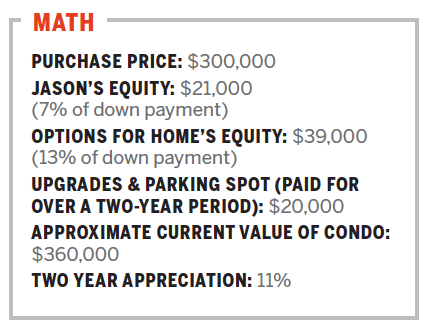 To be able to afford this, Options For Homes takes a no-frills approach to their buildings: There are no pools, saunas or weight rooms, no 24-hour concierge and no fancy foyer artwork. Not only does this keep ongoing monthly maintenance costs down, but what’s saved is passed on to the buyer, in the form of an equity credit. “Options For Homes provides up to 13% equity to each buyer,” says Pattison. “This becomes a registered second mortgage that’s paid back in full, either when the owner decides to sell or rent out the unit.”
To be able to afford this, Options For Homes takes a no-frills approach to their buildings: There are no pools, saunas or weight rooms, no 24-hour concierge and no fancy foyer artwork. Not only does this keep ongoing monthly maintenance costs down, but what’s saved is passed on to the buyer, in the form of an equity credit. “Options For Homes provides up to 13% equity to each buyer,” says Pattison. “This becomes a registered second mortgage that’s paid back in full, either when the owner decides to sell or rent out the unit.”
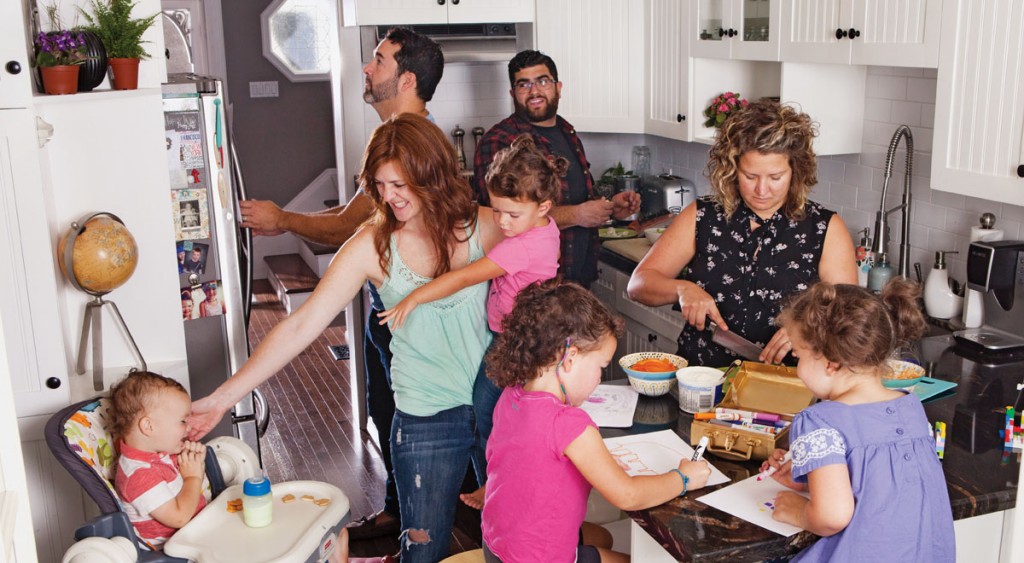
“If you’re buying a house to flip with a friend, remember that it’s a business decision. You’re not doing it to have a better friendship, you’re doing it to have a better financial future,” says Josiah.At the time of purchase, both couples had the option of taking an equity stake in the flip-house but the Schlereths only chose sweat equity, so the two couples came to an agreement: Rachel and Josiah would go on the title for the home and take responsibility for the cost of the renovations and for the majority of the monthly costs; everyone would live in the home during the renovations, which would last for about two years, at which point the house would go back on the market. Once sold, the Gordons would receive approximately 70% of the profit and the Schlereths would get about 30%, once all expenses had been reimbursed and fees paid. “Looking back, it would’ve been a good idea to have a signed contract,” says Josiah. “It seems like a cold thing to do. We’re all friends, we all agree. But a renovation is a fluid project and a contract would’ve standardized the process and kept everyone’s interests safe.” Take for instance, the moment when the Schlereths realized that, for the sake of their own sanity and for the friendship, they just had to move out. It was just a few months left on the renovations, but, as Josiah recalls, “it was hard for four adults and four children to share such a small space.”
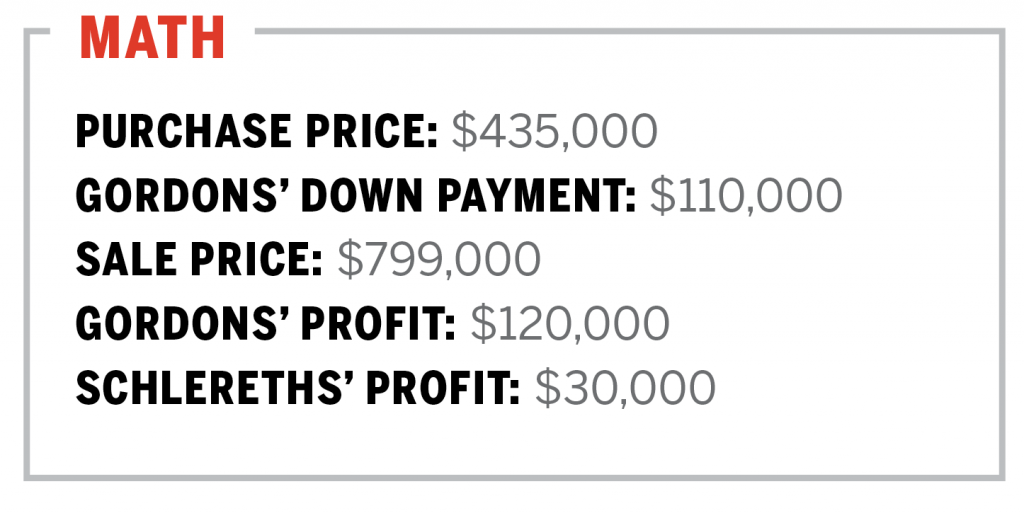 Also renovations on an old, worn-down house don’t follow a simple path. “We’d have a renovation plan, only to find a problem that had to be dealt with immediately,” explains Josiah. Like when the city’s water pipe, that ran under the house, burst, leaking water into the home’s foundation. “I had to rent equipment to trench the concrete before getting a plumber to fix the pipes,” says Josiah. And on and on it went. They’d spend a few days tackling a scheduled part of the renovation, only to have a problem crop up, at an unanticipated cost and adding time to the overall project. “At one point, we only had one, shared living room and one working bathroom and when you add job losses, business start-ups, parenting styles, and the stress a newborn baby brings, you can imagine how hard it was for all of us.”
But they did it. The Schlereths moved out while the renovations were completed and in June of 2015, the home went on the market. Two months later it was sold. Yet, when asked if he’d ever again buy a house with a friend to renovate, sell and earn a profit Josiah’s reply is instantaneous: “No.” He adds, “there’s no way we could’ve bought our current house without all the work we did with our friends on the flip house, but it came with a lot of stress and strain. I’m glad we did it. Financially it put us in a much better position. I just don’t want to do it again.”
Also renovations on an old, worn-down house don’t follow a simple path. “We’d have a renovation plan, only to find a problem that had to be dealt with immediately,” explains Josiah. Like when the city’s water pipe, that ran under the house, burst, leaking water into the home’s foundation. “I had to rent equipment to trench the concrete before getting a plumber to fix the pipes,” says Josiah. And on and on it went. They’d spend a few days tackling a scheduled part of the renovation, only to have a problem crop up, at an unanticipated cost and adding time to the overall project. “At one point, we only had one, shared living room and one working bathroom and when you add job losses, business start-ups, parenting styles, and the stress a newborn baby brings, you can imagine how hard it was for all of us.”
But they did it. The Schlereths moved out while the renovations were completed and in June of 2015, the home went on the market. Two months later it was sold. Yet, when asked if he’d ever again buy a house with a friend to renovate, sell and earn a profit Josiah’s reply is instantaneous: “No.” He adds, “there’s no way we could’ve bought our current house without all the work we did with our friends on the flip house, but it came with a lot of stress and strain. I’m glad we did it. Financially it put us in a much better position. I just don’t want to do it again.”
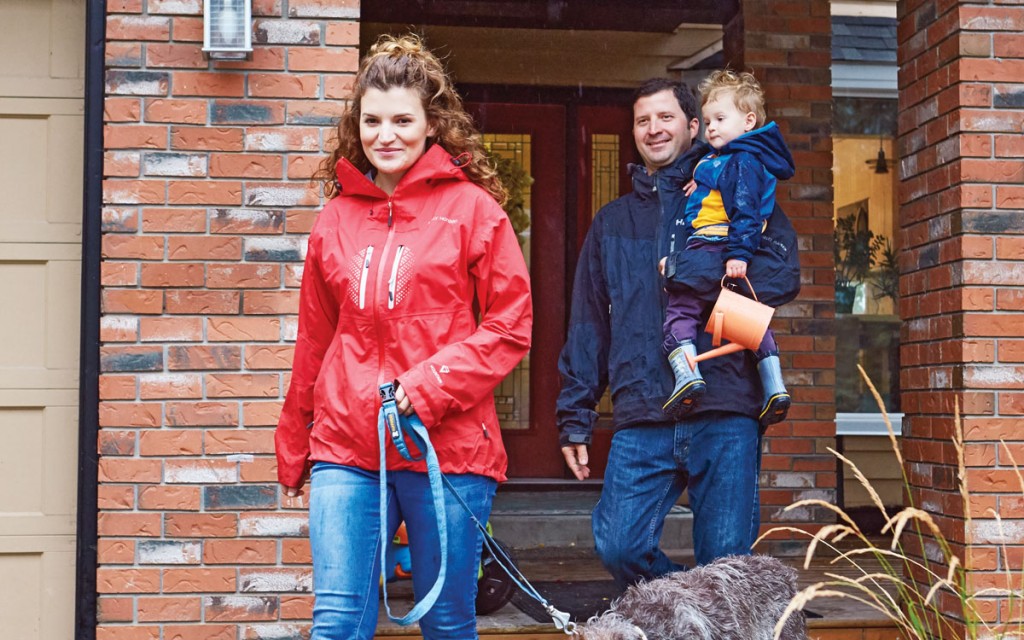
“Don’t buy a forever home. Buy a right-now home; a home that will last you six to 10 years, then reevaluate at that time,” advises JessicaStill, she doesn’t think they did too badly. “We don’t have a mountain view, but we’re perched on a hill with a lovely view of downtown Calgary.” Better still, because they stuck to their budget, they know that they can carry the house on just Chris’s salary of about $120,000 per year. That means Jessica’s part-time hours as a freelance graphic artist provides the family with extra spending cash. “Doing it this way meant going back to work was a choice, rather than a need. It gave us options, and that’s a great feeling.”
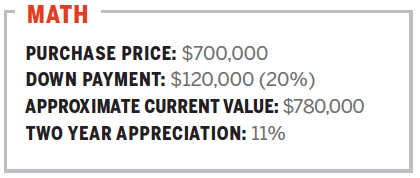 Yet, despite all the planning and number crunching, the couple were caught off-guard with the details. For instance, they purchased a home with an unfinished basement, which they turned into a mortgage-helper rental suite. “Between the cash we saved and the RRSP money we used through the Home Buyers’ Plan, we managed to put $120,000 down. Our mortgage was still big, at $580,000, but it was manageable, particularly with the extra rental income.” But a year passed and both Jessica and Chris realized that even with the extra cash the complications of being a landlord didn’t suit them. Also, it was hard to find a tenant that didn’t mind newborn baby screams and, now, the pitter-patter of toddler feet. “That extra money looked great on paper,” says Jessica, “but we just didn’t realize how much we valued our privacy.” A year in, the Whitings stopped renting out their basement.
Yet, despite all the planning and number crunching, the couple were caught off-guard with the details. For instance, they purchased a home with an unfinished basement, which they turned into a mortgage-helper rental suite. “Between the cash we saved and the RRSP money we used through the Home Buyers’ Plan, we managed to put $120,000 down. Our mortgage was still big, at $580,000, but it was manageable, particularly with the extra rental income.” But a year passed and both Jessica and Chris realized that even with the extra cash the complications of being a landlord didn’t suit them. Also, it was hard to find a tenant that didn’t mind newborn baby screams and, now, the pitter-patter of toddler feet. “That extra money looked great on paper,” says Jessica, “but we just didn’t realize how much we valued our privacy.” A year in, the Whitings stopped renting out their basement.
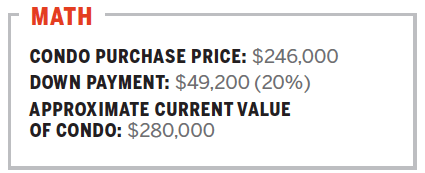 “We realized, this isn’t our forever home,” says Jenna. “We didn’t need to plan for every contingency.” Rather than focus on how much space they could buy, the couple focused on their budget. The goal was to keep the mortgage, interest and property tax payments to about $1,200 per month—what they previously paid in rent. One reason was that at the time of purchase, in September 2015, Nick was still a freelance writer with irregular pay (he’s known as the Gentleman Journalist). “We needed to know that we could carry the place and build equity on just one salary,” he explains. And the move west? “We realized that being in a particular neighbourhood wasn’t as important as whether or not we could continue doing what we loved.” These days, Nick and Jenna are planning their wedding, while enjoying what they call their “big backyard,” Toronto’s waterfront. “When we do move, we probably won’t head back into the city,” says Jenna. Instead, the couple have their sights set on commuter-friendly Hamilton, Ont. Still, Nick confesses, “we’re never going to own a sprawling 3,000-sq-ft home. We never want to live beyond our means.”
“We realized, this isn’t our forever home,” says Jenna. “We didn’t need to plan for every contingency.” Rather than focus on how much space they could buy, the couple focused on their budget. The goal was to keep the mortgage, interest and property tax payments to about $1,200 per month—what they previously paid in rent. One reason was that at the time of purchase, in September 2015, Nick was still a freelance writer with irregular pay (he’s known as the Gentleman Journalist). “We needed to know that we could carry the place and build equity on just one salary,” he explains. And the move west? “We realized that being in a particular neighbourhood wasn’t as important as whether or not we could continue doing what we loved.” These days, Nick and Jenna are planning their wedding, while enjoying what they call their “big backyard,” Toronto’s waterfront. “When we do move, we probably won’t head back into the city,” says Jenna. Instead, the couple have their sights set on commuter-friendly Hamilton, Ont. Still, Nick confesses, “we’re never going to own a sprawling 3,000-sq-ft home. We never want to live beyond our means.”
Share this article Share on Facebook Share on Twitter Share on Linkedin Share on Reddit Share on Email